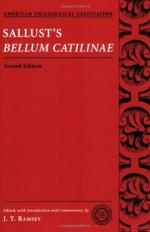|
This section contains 4,335 words (approx. 15 pages at 300 words per page) |

|
SOURCE: Wiedemann, Thomas. “Sallust's Jugurtha: Concord, Discord, and the Digressions.” Greece & Rome 40, no. 1 (April 1993): 48-57.
In the following essay, Wiedemann discusses the three digressions in the Bellum Jugurthinum—about the ethnography of north Africa, civil unrest in Rome, and the legend of the Philaeni—which he argues Sallust used to support his belief in social harmony.
The current fashion for emphasizing ambiguities and discontinuities in literary texts should have found Sallust's writings congenial. The Catiline explores competing and contradictory claims to virtus, exemplified by Caesar, Cato, and Catiline himself, a paragon of ambiguity in contrast to the unproblematic Cicero. The Jugurthine War is twice the length, with a more complicated structure and a wider range of material, including three formal digressions. A concern with the relationship between virtue and success, and with conflict between alternative virtues, is central to this monograph too; it concludes with a victory achieved...
|
This section contains 4,335 words (approx. 15 pages at 300 words per page) |

|


